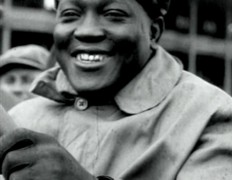 By John F. McKenna (McJack): Johnson won the World Heavyweight Colored Championship in 1903, but his shot at the World Heavyweight Championship was still five years away. With over fifty fights under his belt, Johnson began in earnest to pursue the big prize. Finally in 1908 Johnson, after years of following Heavyweight Champion Tommy Burns halfway around the world, caught up to him in Sydney, Australia.
By John F. McKenna (McJack): Johnson won the World Heavyweight Colored Championship in 1903, but his shot at the World Heavyweight Championship was still five years away. With over fifty fights under his belt, Johnson began in earnest to pursue the big prize. Finally in 1908 Johnson, after years of following Heavyweight Champion Tommy Burns halfway around the world, caught up to him in Sydney, Australia.
On December 26, 1908 Jack Johnson became the first black man to win the Heavyweight Championship of the World. This was a full six years after Lightweight Champion Joe Gans became the first African American champion. The fight lasted fourteen rounds before the police rushed the ring and halted proceedings. Johnson was awarded a 14 round TKO by the referee. After the fight author and journalist Jack London called for a “Great White Hope” to win the championship back for the white race. Boxing promoters hyped each contender Johnson fought as a “White Hope”. Many of the fights were exhibitions. Stanley Ketchel, the great Middleweight Champion attempted to double cross Johnson by uncorking his patented right cross in an exhibition fight. Johnson went down, but jumped up immediately and KO’d Ketchel. On May 19, 1909 Johnson fought to a disappointing six round draw with defensive whiz, Philadelphia Jack O’Brien. Johnson weighed 205 lbs to O’Brien’s 161 lbs.
The fervor for a White Hope continued to grow. Former Heavyweight Champion James J. Jeffries, who had not fought in six years and whose weight had ballooned to 300 lbs was cajoled into making an ill advised comeback. The bout was held on July 4, 1910 in a ring constructed for the occasion in Reno, Nevada (Jack Johnson vs Jim Jeffries – You Tube). Jeffries, who had lost 80 lbs in preparation for the fight, was but a shell of his former self and was soundly thrashed. Johnson, as was his custom, taunted and tortured the once great champion, which served to enrage not only the white fans in attendance, but white fans across America. Riots across America would break out that evening, the Fourth of July. Some of the “riots” were merely African American citizens celebrating the victory over Jeffries. Riots occurred in over fifty cities across America. Johnson earned $65,000 for his victory over Jeffries, a huge amount of money for the time. A number of American film companies filmed the fight with the intent of making a documentary about the “Fight of The Century” as it was billed. Immediately a movement was started in several states to prevent the distribution of the film. In addition, Congress banned prizefight films from being distributed across state lines in 1912.